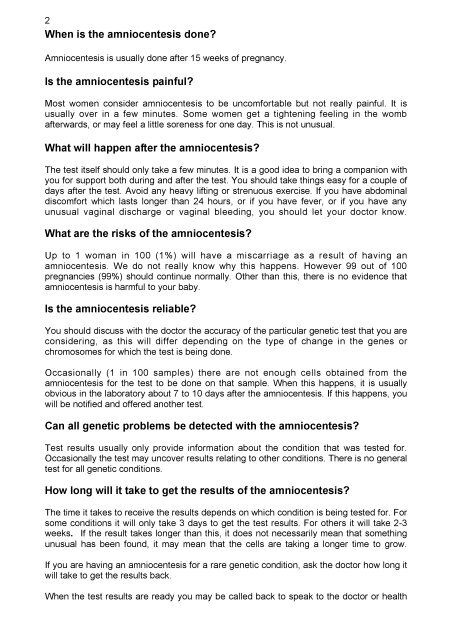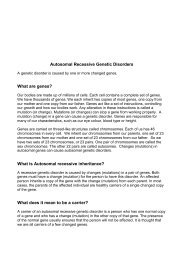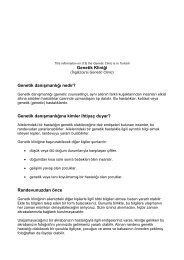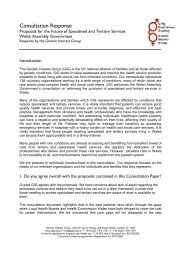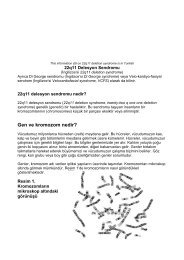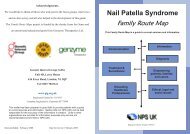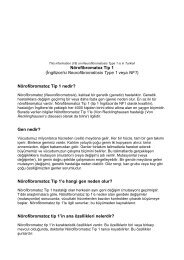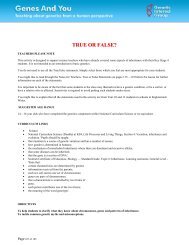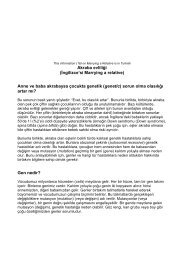The Amniocentesis Test - Genetic Alliance UK
The Amniocentesis Test - Genetic Alliance UK
The Amniocentesis Test - Genetic Alliance UK
Create successful ePaper yourself
Turn your PDF publications into a flip-book with our unique Google optimized e-Paper software.
2<br />
When is the amniocentesis done?<br />
<strong>Amniocentesis</strong> is usually done after 15 weeks of pregnancy.<br />
Is the amniocentesis painful?<br />
Most women consider amniocentesis to be uncomfortable but not really painful. It is<br />
usually over in a few minutes. Some women get a tightening feeling in the womb<br />
afterwards, or may feel a little soreness for one day. This is not unusual.<br />
What will happen after the amniocentesis?<br />
<strong>The</strong> test itself should only take a few minutes. It is a good idea to bring a companion with<br />
you for support both during and after the test. You should take things easy for a couple of<br />
days after the test. Avoid any heavy lifting or strenuous exercise. If you have abdominal<br />
discomfort which lasts longer than 24 hours, or if you have fever, or if you have any<br />
unusual vaginal discharge or vaginal bleeding, you should let your doctor know.<br />
What are the risks of the amniocentesis?<br />
Up to 1 woman in 100 (1%) will have a miscarriage as a result of having an<br />
amniocentesis. We do not really know why this happens. However 99 out of 100<br />
pregnancies (99%) should continue normally. Other than this, there is no evidence that<br />
amniocentesis is harmful to your baby.<br />
Is the amniocentesis reliable?<br />
You should discuss with the doctor the accuracy of the particular genetic test that you are<br />
considering, as this will differ depending on the type of change in the genes or<br />
chromosomes for which the test is being done.<br />
Occasionally (1 in 100 samples) there are not enough cells obtained from the<br />
amniocentesis for the test to be done on that sample. When this happens, it is usually<br />
obvious in the laboratory about 7 to 10 days after the amniocentesis. If this happens, you<br />
will be notified and offered another test.<br />
Can all genetic problems be detected with the amniocentesis?<br />
<strong>Test</strong> results usually only provide information about the condition that was tested for.<br />
Occasionally the test may uncover results relating to other conditions. <strong>The</strong>re is no general<br />
test for all genetic conditions.<br />
How long will it take to get the results of the amniocentesis?<br />
<strong>The</strong> time it takes to receive the results depends on which condition is being tested for. For<br />
some conditions it will only take 3 days to get the test results. For others it will take 2-3<br />
weeks. If the result takes longer than this, it does not necessarily mean that something<br />
unusual has been found, it may mean that the cells are taking a longer time to grow.<br />
If you are having an amniocentesis for a rare genetic condition, ask the doctor how long it<br />
will take to get the results back.<br />
When the test results are ready you may be called back to speak to the doctor or health


